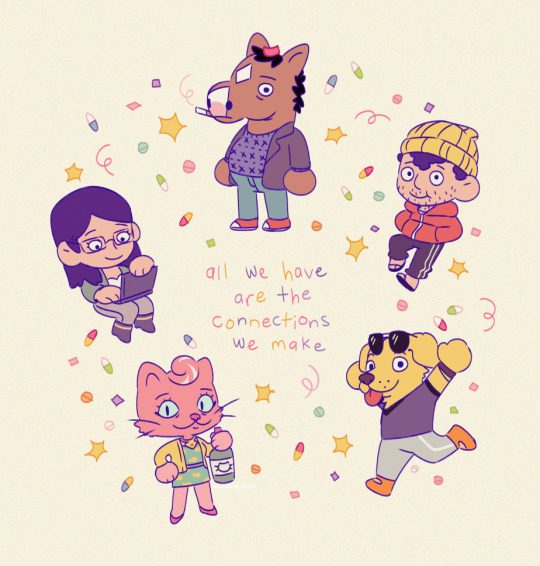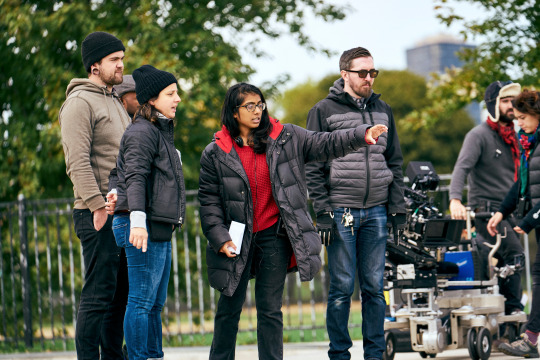#just finished bojack two days ago. much to reflect on
Photo

I’m sorry I never called you after.
(please fullview arghhh tumblr formatting is evil)
#bojack horseman#todd chavez#diane nguyen#princess carolyn#mr peanutbutter#fanart#artists on tumblr#FIGHTING WITH THE FORMAT OF THIS FOR MANY HOURS ARGHH i give up#just finished bojack two days ago. much to reflect on#stupid sexy will arnett voice#my surprise fave is beatrice :(#edit: fixed bojack's nose. charm point
7K notes
·
View notes
Photo

Entertainment Spotlight: Minhal Baig, Hala
Writer and director Minhal Baig recently released a feature-length film, Hala, about a Pakistani-American teenager that uncovers a secret that threatens to unravel her family, which premiered in the U.S. Dramatic Competition at the 2019 Sundance Film Festival. She previously served as a story editor on Bojack Horseman (Netflix) and staff writer on Ramy (Hulu). In 2017, she was chosen to participate in Ryan Murphy's Half Foundation Directing Mentorship. Minhal took some time out of her busy schedule to answer some of our questions:
Without any spoilers, what scene, moment, or line from Hala are you most excited for audiences to see?
The scene between Hala and Eram in the shopping mall parking lot was a turning point in the writing process for me. Their relationship is fraught and because the story is being told from Hala’s perspective, we’re more aligned with her than we are with her mother. But in this scene, the perspective opens up a little bit. Eram makes some valuable points, albeit in a harsh way. She chastises Hala for marginalizing her and even asks her, rather bluntly, whether she looks down on her. This was a difficult scene to write because it came from such a personal place. I reflected on my own experience of treating my mother this way, and how differently I look back at those interactions now.
The story of Hala is one that will resonate with many people grappling with similar issues in their own lives. What do you hope that audiences take away from the film?
I hope that viewers can take away that we are more similar—in complicated family dynamics and coming-of-age—than we are different. Hala came from a very specific place, drawn from my lived experience. It’s not autobiographical, but there was emotional truth in Hala’s search for self. It’s not a search defined by her ties to her culture, faith or even her sexuality; it’s all of these things at once. I want people to be moved, to extend compassion, to be feel less alone.
What inspired you to write Hala?
Hala came out of a place of processing a pain that I experienced in my own adolescence. I was wrestling with my own identity as a teenager and my relationship with my family. It was a difficult time in my own life when I chose to leave home for college. I don’t think my parents were ready for that, but I also wasn’t quite ready, either. I was forced to learn a lot on my own and much of that is reflected in Hala’s own journey. While the film drew upon my personal life, it eventually became her story and needed to be true to the character.
If you could give any character from the film a piece of advice, who would you speak to and what advice would you give?
I think about how much pain and anguish could have been avoided had I been more open with my family. There was so much that I hid and continue to hide, not necessarily out of a sense of self-preservation anymore but because I didn’t want to burden them with the reality that I was not living up to their expectations. If I could talk to Hala, I would let her know that she’s not alone in her experiences and that vocalizing her feelings to her family, while difficult, might be what brings them closer together.
What’s the first thing that you remember being a fan of?
I remember seeing Jurassic Park and Hum Aapke Hain Koun with my family in a theatre. They were early cinematic experiences that I’ll never forget. For a little while, we could forget everything and just live in the world of a movie. It was everything.
Do you have any interesting facts about the filming of Hala that viewers would be surprised to know?
The high school that we filmed at, Northside College Prep—is where I went to school in Chicago. It was a very surreal experience to shoot in a classroom that I’d been in ten years ago as a teenager.
Who are your biggest influences?
Andrea Arnold, Lynne Ramsay, Celine Sciamma, Asghar Farhadi, Ruben Ostlund, Claire Denis, Maren Ade, Kelly Reichardt, Sofia Coppola, Debra Grafik, Abbas Kiarostami, Paul Thomas Anderson, Apichatpong Weerasethakul and Xavier Dolan.
The biggest film influences on Hala were 35 Shots of Rum, Fish Tank and A Separation.
Can you take us through a typical day on set?
Every day is different depending on what I’m scheduled to shoot that day. If it’s an early call time, I head to set early with the cinematographer and go over our shots. We walk through everything together and then include the assistant director in our conversation. Then, I check in with my actors—to make sure they feel comfortable with what we’re shooting. Once I’ve done all of that, we read through the scene, block it, and the actors go away to get dressed while the various departments work to bring the scene to life. When the actors return, I usually do a rehearsal and once I feel that it’s ready, we shoot. I like to keep things moving and reset instead of calling cut, or do a few takes in a row so that the actors’ momentum isn’t lost. We finish a shot and if it’s good with everyone, I move on. The usual day on Hala required us to shoot five or six pages a day with multiple location moves, so imagine doing all of this at a relentless pace all day. Once we hit twelve hours, we call it a day.
What’s next for you?
I’m working on a film that centers the live of children, and specifically, the friendship between two nine-year old boys. It’s set in 1992. I’ve spent the last two years, on-and-off, taking a very journalistic approach to this story, spending a lot of time with people whose lived experiences I’m hoping to reflect in the final film. It’s a labor of love while I work a day job writing television.
Thanks for taking the time, Minhal! Hala is now available on Apple TV+.
1K notes
·
View notes